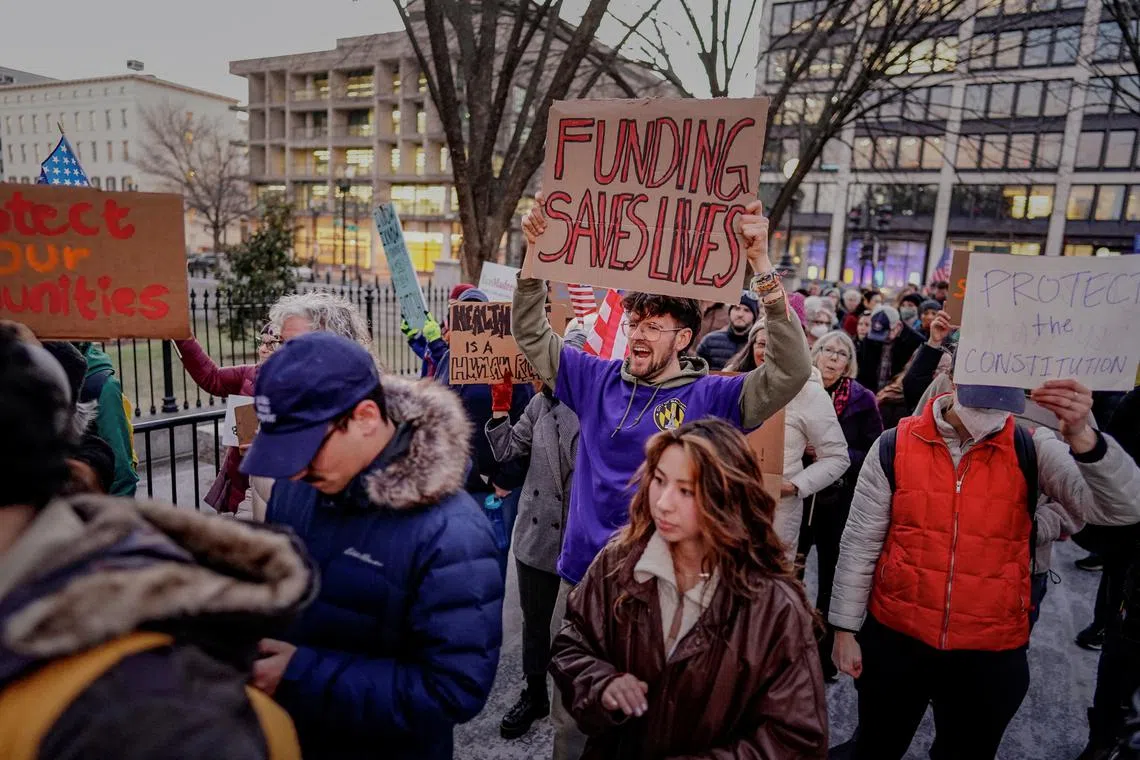White House revokes aid spending freeze in face of legal challenges
Sign up now: Get ST's newsletters delivered to your inbox

People rallying in support of federal funding and in opposition to US President Donald Trump's order to pause all federal grants and loans, near the White House in Washington, on Jan 28.
PHOTO: REUTERS
Follow topic:
WASHINGTON – US President Donald Trump’s administration appeared to abandon its proposed freeze
In a whip-saw reversal to a policy unveiled with little explanation late on Jan 27, the White House budget office told federal agencies it was rescinding a memo that had ordered the pause in grant and loan payments.
The new order came shortly before a federal court hearing on a lawsuit filed by Democratic state attorneys-general trying to stop the freeze. A White House official said the reversal was an attempt to short-circuit legal challenges.
US District Judge John McConnell nonetheless went ahead with the hearing, where he said he was inclined to temporarily block the administration’s aid freeze, though he did not immediately do so.
At the virtual hearing from Providence, Rhode Island, Mr McConnell, an appointee of former Democratic president Barack Obama, said the states have convinced him that the “inappropriate effects” of the now-rescinded funding freeze directive “are going to continue and that hasn’t changed based on comments by the President’s press secretary”.
The administration had said the freeze was intended to provide time to review and halt funds to programmes that Mr Trump has sought to quash since returning to office, such as efforts to promote diversity and green energy, and much foreign aid.
“We are merely looking at big parts of the bureaucracy where there has been waste and abuse,” Mr Trump said at the White House.
The freeze had already been blocked temporarily by another federal judge in Washington, who is handling a different legal challenge filed by several advocacy groups.
The reversal is the latest head-spinning move for a President who has pushed boundaries since taking office on Jan 20. He has halted wide swathes of foreign aid, pardoned supporters who attacked US Capitol police, and offered buyouts to thin the ranks of civil-service workers.
Guantanamo plan
At the White House, Mr Trump said he would order 30,000 beds prepared at the Guantanamo Bay military prison on the island of Cuba to handle migrants being deported as part of his immigration crackdown.
The White House said Mr Trump would target pro-Palestinian student protesters for deportation as well by revoking their student visas, in a sign that people who are in the country legally could be targeted for their political views. Mr Trump has been a vocal supporter of Israel during its war with Hamas.
Democrats in Congress say Mr Trump has repeatedly broken the law since returning to power, but his Republican allies have shown little interest so far in defying him.
The Republican-controlled Senate has confirmed all of his appointees so far, even Defence Secretary Pete Hegseth, who squeaked by in a 51-50 vote after facing accusations of sexual assault and alcohol abuse. Mr Hegseth has moved aggressively to implement Mr Trump’s agenda by banning transgender troops and diversity programmes.
On Jan 29, he revoked security protections for Mr Mark Milley, who served as the top US military official during Mr Trump’s first 2017 to 2021 term in office before emerging as a prominent critic.
In a confirmation hearing on Jan 29, Mr Trump’s pick for health secretary, Mr Robert F. Kennedy Jr, came under attack for his anti-vaccine views. But most Republicans at the hearing appeared to support him.
Mr Howard Lutnick, Mr Trump’s pick for commerce secretary, faced a largely friendly reception from lawmakers as he echoed the President’s support for tariffs and his complaints about Canada’s trade practices.
Republicans defend spending freeze
Republican lawmakers said they were unfazed by Mr Trump’s attempt to freeze federal aid, even though that would undercut Congress’ control over the US$6.75 trillion (S$9.1 trillion) in federal budget.
“I, for one, am glad to have a president in the White House who is delivering on his promise to get our fiscal house in order,” said Mr Tom Emmer, the No. 3 Republican in the House of Representatives, at a retreat in Miami.
Medical payments disrupted by Mr Trump’s freeze resumed on Jan 29, according to an association of state agencies. But the payment system for housing authorities was still not functioning, Democratic Senator Patty Murray said.
High-ranking Republicans and Democrats in Congress who oversee federal budgets and spending on Jan 29 applauded the Trump administration’s reversal.
Senate Appropriations Committee chair Susan Collins, a Republican, said in a statement that “while it is not unusual for incoming administrations to review federal programmes and policies, this memo was overreaching and created unnecessary confusion and consternation”.
Ms Murray said the Trump administration, “through a combination of sheer incompetence, cruel intentions and a wilful disregard of the law, caused real harm and chaos for millions over the span of the last 48 hours”. REUTERS

